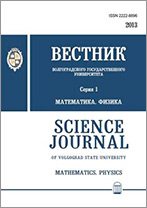|
This article is cited in 5 scientific papers (total in 5 papers)
Mathematics
Mixed Boussinesq-type differential equation
T. K. Yuldashev
M. F. Reshetnev Siberian State Aerospace University
Abstract:
Mathematical modeling of many processes occurring in the real world leads to the study of direct and inverse problems for equations of mathematical physics. Mixed and boundary value problems for partial differential and integro-differential equations by virtue of their importance in the application are one of the most important parts of the theory of differential equations. In the case, when the boundary of the flow of physical process not applicable for measurements, as an additional information can be used at nonlocal conditions in the integral form.
We propose a method of studying the one-value solvability of the nonlocal problem for a mixed Boussinesq-type differential equation. Such type of differential equations models many natural phenomena and appears in many fields of sciences. For this reason, a great importance in the works of many researchers was given to this type of equations.
We use the spectral method based on Fourier method of separation of variables. Application of this method of separation of variables can improve the quality of formulation of the considered problem and facilitate the processing procedure.
So in this article we consider in the rectangular area $D=\{(x,t)| 0<x<1, -\alpha <t< \beta\}$ a nonlocal mixed problem for a mixed Boussinesq-type differential equation
\begin{equation*}
\Im U =
\begin{cases}
U_t - U_{txx} - U_{xx} + {\nu}^2 U = 0, & t>0,\\
U_{tt} - U_{ttxx} - U_{xx} + {\nu}^2 U = 0, & t<0.
\end{cases}
\tag{1}
\end{equation*}
where $\nu, \alpha$ and $\beta$ are real positive numbers.
We study the problem: Find in the domain $D$ a function $U(x, t)$ satisfying the following conditions
\begin{equation*}
U(x,t) \in C (\overline{\Omega}) \cap C^1 (\Omega \cup \{x=0\} \cup \{x=1\}) \cap C^2 (\Omega_{\_}) \cap C^{2,1}_{x,t} (\Omega_{+} \cup \{t=\beta\}), \tag{2}
\end{equation*}
\begin{equation*}
\Im U(x,t) \equiv 0, (x,t) \in \Omega_{\_} \cup \Omega_{+} \cup \{t=\beta\}, \tag{3}
\end{equation*}
\begin{equation*}
U(0,t)=U(1,t), \quad -\alpha \le t \le \beta, \tag{4},
\end{equation*}
\begin{equation*}
U_x(0,t)=U_x(1,t), \quad -\alpha \le t \le \beta, \tag{5},
\end{equation*}
\begin{equation*}
\int_{-\alpha}^0 U(x,t) dt = \psi (x), \quad 0 \le x \le 1, \tag{6}
\end{equation*}
where $\psi (x)$ is given a sufficiently smooth function, $\psi (0) = \psi (1)$, $\psi ' (0) = \psi ' (1)$.
First we prove that, if there exists a solution $U(x, t)$ of the problem (2)–(6), then it is unique only when the following condition is fulfilled
\begin{equation*}
\Delta_n (\alpha) = 1 - \cos \lambda_n \alpha + \frac {1} {\lambda_n} \sin \lambda_n \alpha \ne 0, \tag{7}
\end{equation*}
where $\lambda_n = \sqrt{\frac{\nu^2 + \mu_n^2}{1 + \mu_n^2}}$, $\mu_n = 2 \pi n, n = 1,2,\ldots$
We consider the case, when the condition (7) is violated. We suppose that $\Delta_n(\alpha)=0$ for some $\alpha$ and $n = m$, then homogeneous problem (2)–(6) in $\psi (x) \equiv 0$ has nontrivial solution
$$
U_m (x,t) = X_m (x) \cdot T_m(t),
$$
where $X_m(x): \{1, \cos \mu_m x, \sin \mu_m x\}$,
\begin{equation*}
T_m(t) =
\begin{cases}
e^{- \lambda_m^2 t}, & t>0,\\
\cos \lambda_m t -\lambda_m \sin \lambda_m t, & t < 0.
\end{cases}
\end{equation*}
The condition $\Delta_n (\alpha) = 0$ is equivalent to the equality $\lambda_n = \lambda_n \cos \lambda_n \alpha - \sin \lambda_n \alpha$.
Hence we see that the equality $\Delta_n (\alpha) = 0$ is possible only when
$$
\alpha = \frac{2 \pi k}{\lambda_n}, \quad k \in N.
$$
For other values of $\alpha$ the condition (7) holds. We note that there is a constant $C_0 > 0$ such that for sufficiently large $n$ holds the estimate
\begin{equation*}
\inf_n |\Delta_n (\alpha)| \ge C_0 > 0. \tag{8}
\end{equation*}
If the conditions (7) and (8) are fulfilled, then the solution of problem (2)–(6) exists and it can be presented as the sum of series
$$
U(x,t) = \frac{\vartheta_0 (t)}{2}+\sum_{n=1}^{\infty} \vartheta_n (t) \cos \mu_n x + \sum_{n=1}^{\infty} u_n (t) \sin \mu_n n x,
$$
where
\begin{equation*}
u_n(t) =
\begin{cases}
A_n \psi_n e^{- \lambda_n^2 t}, & t>0,\\
A_n (\cos \lambda_n t - \lambda_n \sin \lambda_n t) \widetilde{\psi}_n, & t<0,
\end{cases}
\end{equation*}
\begin{equation*}
\vartheta_n(t) =
\begin{cases}
A_n \widetilde{\psi}_n e^{- \lambda_k^2 t}, & t>0,\\
A_n (\cos \lambda_n t - \lambda_n \sin \lambda_n t) \widetilde{\psi}_n, & t<0,
\end{cases}
\end{equation*}
$$
A_n = \frac{1}{\Delta_n (\alpha)}.
$$
According to the problem: $\psi(x) \in C^3[0;1]$ and on the segment $[0; 1]$ it has piecewise continuous derivative of fourth order and
$$
\psi (0) = \psi (1), \psi '(0) = \psi '(1), \psi ''(0) = \psi ''(1), \psi '''(0) = \psi '''(1).
$$
Further the theorem is held. We suppose $\Delta_n (\alpha) = 0$ 0 for some $\alpha$ and $n = k_1, \ldots, k_s$, where $1 \le k_1 < k_2 < \ldots < k_s$, $s$ is fixed natural number and there are orthogonality conditions
\begin{align*}
\psi_n = 2 \int\limits_0^1 \psi (x) \sin \mu_n x dx = 0, n = k_1, \ldots, k_s,\\
{\widetilde{\psi}}_n = 2 \int\limits_0^1 \psi (x) \cos \mu_n x dx = 0, n = k_1, \ldots, k_s.
\end{align*}
Then the solution of the problem (2)–(6) exists, and it is defined as the sum of series
\begin{align*}
U(x,t) = \frac{\vartheta_0 (t)}{2} + \left( \sum_{n=1}^{k_1 - 1} + \sum_{n=k_1+1}^{k_2 - 1} + \ldots + \sum_{n=k_s+1}^{\infty} \right) u_n(t) \sin \mu_n x +\\
+ \left( \sum_{n=1}^{k_1 - 1} + \sum_{n=k_1+1}^{k_2 - 1} + \ldots + \sum_{n=k_s+1}^{\infty} \right) \vartheta_n (t) \cos \mu_n x + \sum_m C_m U_m (x,t),
\end{align*}
where in the last sum $m$ takes the values $k, k_1, \ldots, k_s, C_m$ as arbitrary constants.
Keywords:
mixed-value problem, mixed-type differential equation, Boussinesq-type equation, nonlocal condition, spectral method, one-value solvability.
Citation:
T. K. Yuldashev, “Mixed Boussinesq-type differential equation”, Vestnik Volgogradskogo gosudarstvennogo universiteta. Seriya 1. Mathematica. Physica, 2016, no. 2(33), 13–26
Linking options:
https://www.mathnet.ru/eng/vvgum98 https://www.mathnet.ru/eng/vvgum/y2016/i2/p13
|

| Statistics & downloads: |
| Abstract page: | 352 | | Full-text PDF : | 206 | | References: | 57 |
|




 Contact us:
Contact us: Terms of Use
Terms of Use
 Registration to the website
Registration to the website Logotypes
Logotypes








 Citation in format
Citation in format 
